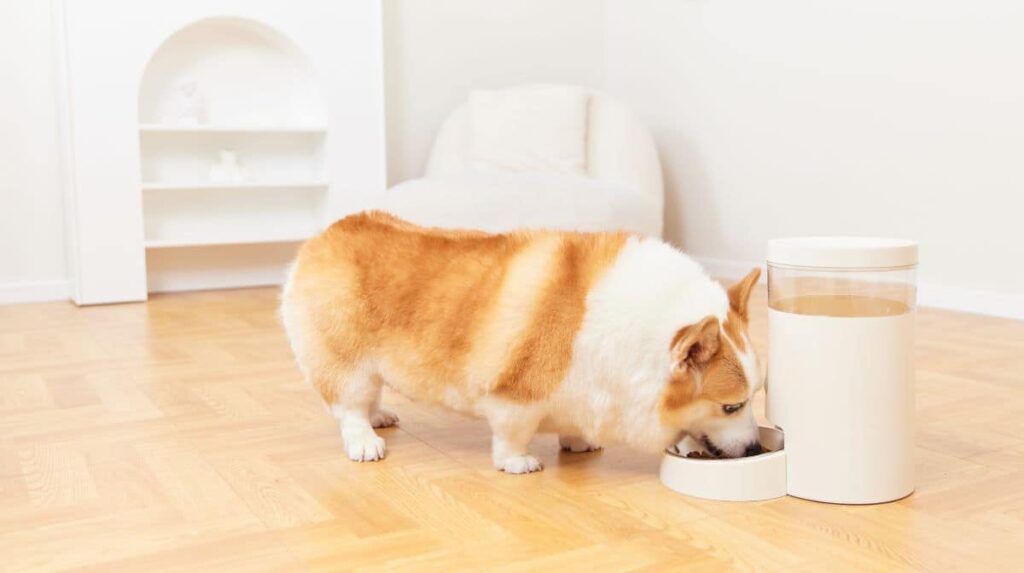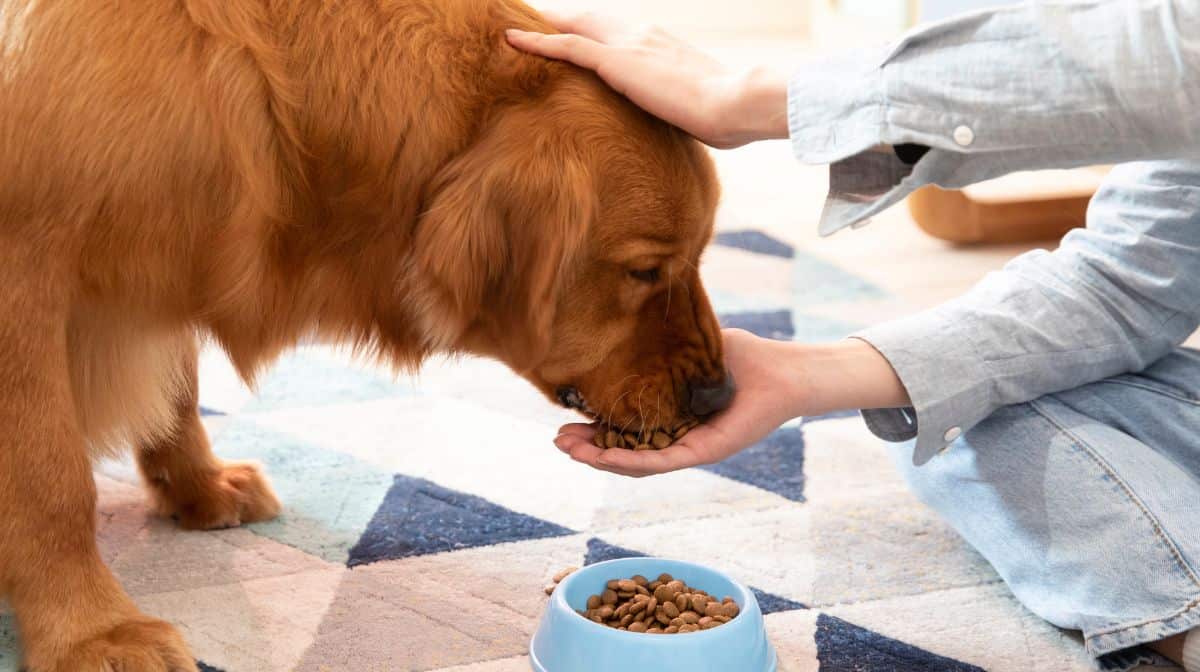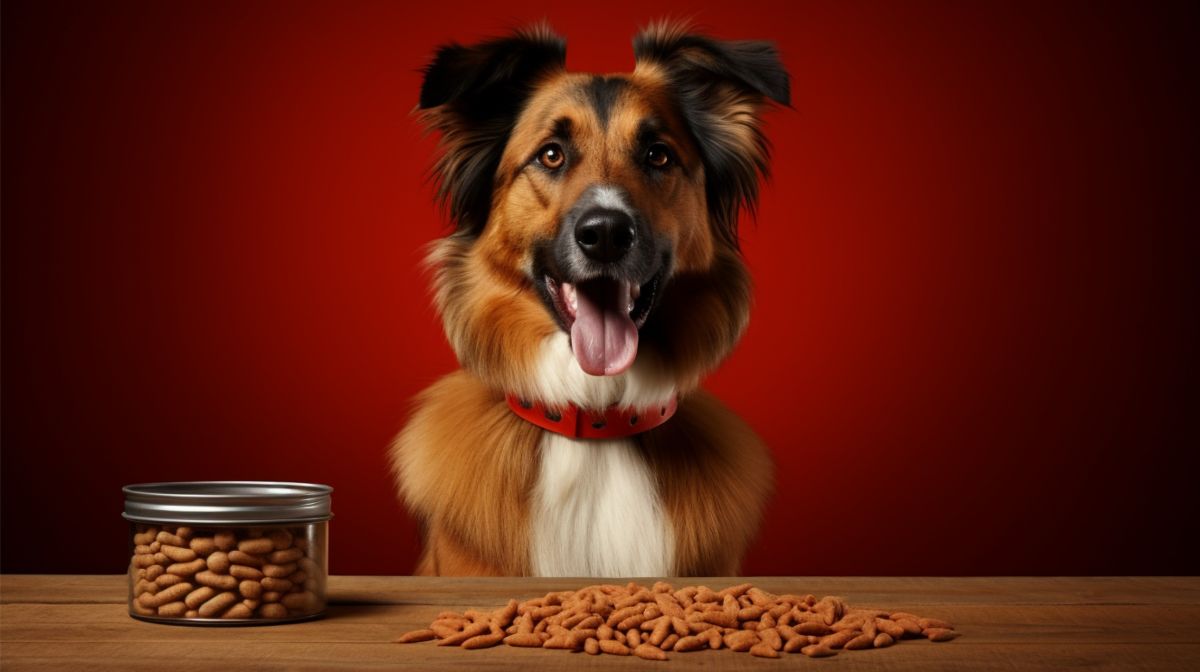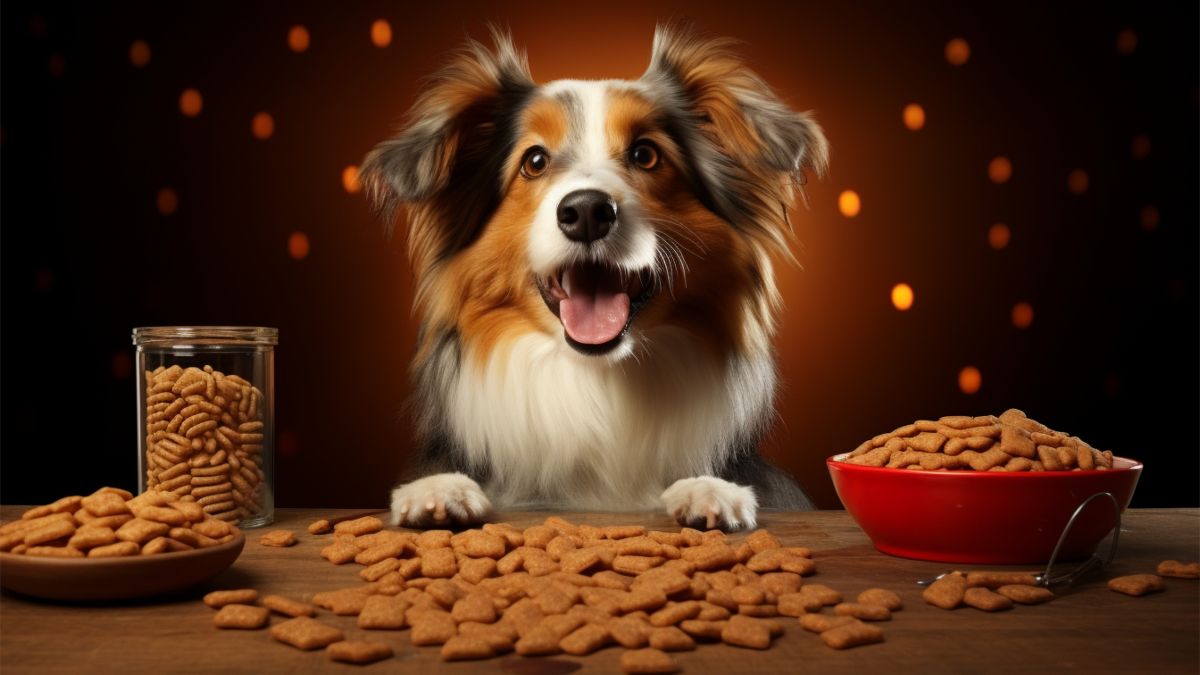What happens if a puppy eats adult dog food? Do you notice any changes in appetite of your puppies?
Basically, consistent feeding adult dog foods to a puppy are the cause of various health issues because of difference in nutritional needs between puppy and adult dogs.
But, it does not a cause for immediate health concern. I have 10 puppies’ dog which are not used to eat adult dog food. Actually, I don’t provide adult dog food of my puppies because of imbalance of nutritional content.
This improper nutrition causes various dental and digestives complications. That’s way; you should feed adult dog food of your growing puppies.

Nutritional Differences between Puppy and Adult Dog Food
Puppy and adult dog food varies depending on the nutritional requirement. Basically, they need different nutritional composition because of its health requirement and age difference.
Protein Content
Puppies food is formulated with including higher levels of high-quality protein sources, such as meat, poultry, or fish. This protein provides the essential amino acids necessary for muscle growth, tissue repair, rapid growth and development. On the other hand, a adult dogs need relatively little amount of protein.
Fat Content
More dietary fat is needed for puppies to grow energy, to support their growing bodies and development of healthy skin and coat. That’s way puppy food contains higher levels of fat in comparison with adult dog food.
Calorie Density
Additionally, puppy’s food is the excellent combination of more calorie-dense to meet the energy requirements of growing puppies. This also helpful to supports their increased activity levels and metabolism.
Calcium and Phosphorus Ratios
Besides, this types of food contains specific ratios of calcium and phosphorus to support proper bone and teeth development. This food combination is more helpful to promote healthy skeletal growth and minimize the risk of developmental orthopedic diseases.
Vitamins and Minerals
Furthermore, puppies’ dog food includes higher levels of vitamins and minerals, such as vitamin D and zinc. This support overall growth and immune function.
DHA and Omega-3 Fatty Acids
Apart from this food contains docosahexaenoic acid (DHA) and omega-3 fatty acid that is important for brain development and cognitive function. This excellent formulation support optimal brain and nervous system development.
Digestibility
As puppies have more sensitive digestive systems; its food is formulated with easily digestible ingredients. These kinds of ingredients enhance digestibility and minimize the risk of gastrointestinal upset.
Potential Risks of Feeding Adult Dog Food to Puppies
Though feeding adult dog food to puppies don’t causes immediate health problem, it is not recommended from me. Because, it must lead to serious health concern in near future that is not expected. Here, I include some potential risks:
Nutritional Imbalance
Puppies have higher energy and nutrient requirements in comparison with an adult dog. But, adult dog food may not the appropriate balance of nutrients such as protein, fat, vitamins, and minerals. That’s way, puppy’s dog lack of proper growth and development.
Calcium and Phosphorus Ratio
Specific ratio of calcium to phosphorus is needed for puppies to healthy bone development. But, Adult dog food is not the ideal ratio that leads to skeletal abnormalities like developmental orthopedic diseases.
Calorie Content
In addition to, puppy’s food require more calories per pound of body weight to support their rapid growth. But, there is no sufficient calorie in adult dog food to meet the needs of growing puppies and later lead to stunted growth or nutritional deficiencies.
Protein Levels
As well as, higher levels of quality protein are necessary for supporting muscle growth and development of puppies. Lack of sufficient protein and inappropriate balance in adult dog food are the main cause of stunted growth.
DHA and EPA
Adequate amounts of omega-3 fatty acids like DHA and EPA is compulsory for brain and vision development for puppies. These nutrients are present in lower amounts in adult dog that is the reason of underdeveloped brain.
Digestibility
Digestive complications are the common problem of feeding adult dog food to puppies consistently.
Signs and Symptoms of Nutritional Deficiency in Puppies
Here, I mention some common signs and symptoms that show the lack of nutrition in puppies. This remarked symptom helps you to understanding the Nutritional Deficiency in Puppies.
Poor Growth
Failure to gain weight or grow at a normal rate is the visible indicator of nutritional deficiency.
Weakness and Lethargy
Puppies who have not essential nutrients shows some symptoms like weak, lethargic, or less active than normal.
Poor Coat and Skin Condition
Nutritional deficiencies generally are showed in dull, dry, or flaky. If your dogs have nutritional deficiencies, it leads to itching, flakiness, or dermatitis.
Developmental Abnormalities
Because of lack of nutrition in puppies dog, it’s walking, running, and coordination are delayed.
Digestive Issues
Puppies may experience digestive problems such as diarrhea, constipation, bloating and excessive gas if your dog has exacerbated digestive complication due to nutritional deficiencies.
Weak Immune System
A lack of essential nutrients contributes to weaken the puppy’s immune system. Additionally, it is responsible for infections, illnesses, and slower recovery from sickness.
Dental Problems
Furthermore, inadequate nutrition is the signal cause of delayed or abnormal tooth eruption, weak or brittle teeth, or gum problems.
Digestive Issues and Nutritional Imbalances
If you serve adult dog food to puppies consistently, it must create digestive complication and lack sufficient nutrition. Those are digestive and nutritional issues are listed here.
Diarrhea
Because of dietary indiscretion, sudden changes in diet, food intolerances or allergies, bacterial or viral infections, and certain medications, puppy’s dog face digestive problem. Basically, inadequate fiber and improper digestion contribute to diarrhea.
Vomiting
There are several cause of vomiting such as dietary indiscretion, food allergies or intolerances, infections, and dietary changes. Additionally, nutrient imbalances in a dog’s diet may trigger severe and frequent vomiting.
Flatulence
As well as, excessive gas production is another cause of flatulence. Indeed, poorly digestible ingredients or imbalances in a dog’s diet cause gastrointestinal tract that lead to gas production and flatulence.
Constipation
Constipation is another problem because of insufficient fiber, inadequate exercise, dietary changes. Also, low fiber content in daily dog food leads to constipation.
Gastrointestinal Upset
Dogs which has sensitive stomachs may experience gastrointestinal upset because of discomfort, gurgling sounds, changes in appetite, dietary indiscretion, food intolerances.
Veterinary Guidance and Treatment
There is no alternative of evaluating the guidance and treatment of veterinarian for ensuring your dog’s health. This guideline is more helpful for dealing with digestive issues and nutritional imbalances.
Diagnostic Evaluation
To identify the underlying cause of your dog’s digestive difficulties, an experienced veterinarian performs physical examination and recommends diagnostic tests. Blood work, fecal analysis, and imaging studies are the common tests for identifying dog’s digestive problem.
Nutritional Assessment
Basically, veterinarians provide guidance on selecting an appropriate diet tailored to your dog’s age, breed, size, health status. They mainly select a most effective diet for your dogs depending on any specific dietary requirements of your dogs.
Dietary Management
veterinarian can recommend dietary modifications to address any nutritional imbalance depending on the diagnostic findings and nutritional assessment.
Treatment Plan
Veterinarian can develop a comprehensive treatment plan incorporating the dogs specific needs. That plan is more fruitful to alleviate symptoms of diarrhea or vomiting. Additionally, they provide supportive care to promote gastrointestinal health.
Monitoring and Follow-Up
Then, veterinarian will monitor your dog’s progress closely and recommend additional diagnostic tests if needs. Basically, they assess the response to treatment and make any necessary adjustments to the management plan for getting a fruitful result.
Preventive Care
Additionally, veterinarians can provide guidance on preventive care measures to prevent future digestive issues. This involves regular wellness exams, parasite control, vaccinations, and dental care and others.
What to Do If a Puppy Eats Adult Dog Food
If a puppy accidentally eats adult dog food, you don’t tense about. You just be patience because this feeding doesn’t cause immediate health concern. In this situation, you just monitor them for any signs of discomfort or digestive upset.
Monitor for Symptoms
You just keep an eye on your puppy to identify any signs of gastrointestinal upset such as vomiting, diarrhea, or abdominal discomfort. This monitoring allows contacting with veterinarian for guidance and suggestion.
Provide Plenty of Water
Ensuring fresh and safe water is crucial for puppies. This drinking water can help flush out any potentially harmful substances.
Observe Behavior
Additionally, you keep a watchful eye on any changes in behavior, such as lethargy or restlessness. Besides, you keep a careful alert on any signs of distress.
Resume Regular Feeding
You should return to feeding your puppy in their regular puppy-specific food. Because, this puppies food are formulated for ensuring the specific nutrients and for proper growing of puppies.
Prevent Access
It is most important for you to take steps to prevent future incidents by ensuring adult dog food is stored securely in containers. Besides, you keep your puppy’s dog in a safe and long distance from those containers.
Consult Your Veterinarian
Furthermore, you must consult with an experienced veterinarian if you notice any sign of discomfort in your puppies.
Tips for Preventing Accidental Feeding
You can follow our own guidelines and techniques to prevent accidental feeding of adult dog food to puppies. I think that this suggestion help you to prevent Accidental Feeding.
Separate Feeding Areas
You can establish separate feeding areas to differentiate adult dogs and puppy’s dog food. Basically, this separation largely helps to prevent mix-ups and ensure appropriate food for puppy’s dogs.
Use Different Containers
Additionally, you store adult dog food and puppy food in clearly labeled, separate containers. This different size, shape and color help you to distinguish those foods easily.
Establish Feeding Routines
Besides, you make a consistent feeding schedule to feed your puppies that help you to separate adult dog food from puppies eating.
Transitioning from Puppy Food to Adult Food
By maintaining a step-by-step guideline that is followed by me, you can easily transit the food habit of your puppies. Those are:
Timing: Best time for transitioning of puppy’s food habit to adult dog is between 6 and 12 months of age, depending on their breed size. But its transition time are changed because of larger breed that us around 12 to 18 months.
Gradual Transition: Abrupt switch in dog food is not good for puppy’s health. So, you take about 7-10 days for transition. This gradual transition reduces digestive complexity.
Mixing Foods: Then, you mix a small amount of adult food into your dog’s puppy food by maintain a standard ratio of about 25% adult food to 75% puppy food.
Monitor Response: Keeping watchful sights to signify any signs of digestive upset during the transition is important. You mainly notice whether puppies suffer vomiting, diarrhea, or changes in appetite or not. You can slow down the transition process and consult your veterinarian for advice if you observe any health problem.
Increase Adult Food: After continuing someday, you gradually increase the proportion of adult food while decreasing the amount of puppy food.
Complete Transition: Within 7-10 days, your dog would be used to eat only adult food. But, you keep bird’s eye view on the response to the new food and make any necessary adjustments based on their health and appetite.
Frequently Asked Questions (FAQs)
1. What happens if my child eats dry dog food?
Dog food is formulated to meet the nutritional needs of dogs and it is not recommended for human feeding. Rather it is harmful for children. It can cause digestive upset, stomachache or diarrhea. So, eating dog food for child is strictly prohibited.
2. What happens if a dog eats puppy food?
Basically puppies’ foods are not ideal for adult dogs because of its long term and immediate adverse effects. There has a higher level of protein, fat, and calories in puppies dog food . But these proteins are not needed for adult dog food. Because it cause excessive weight gain and potential health issues such as obesity and joint problems
3. Is it okay to feed a puppy all life stages food?
Though all life stages food may meet the nutritional needs of both puppies and adult dogs, puppies have specific dietary requirements. Indeed, these types of food are necessary for growth and development of puppy’s dogs. So, Puppy foods are specially formulated with higher levels of certain nutrients, such as protein and certain vitamins and minerals that is supportive healthy growth.
4. Can a puppy get sick from eating human food?
As some human foods like chocolate, grapes, raisins, onions, garlic are harmful and toxic to puppy’s dog food. This toxic human food leads to digestive upset, including vomiting and diarrhea.
Conclusion
What happens if a puppy eats adult dog food? Are you used to serve adult dog food to your puppies? It is true that feeding adult dog food to puppies doesn’t cause any immediate health concern but consistently feeding lead to nutritional deficiencies.
Basically, puppies need a diet which is enriched with higher protein, fat, and certain vitamins and minerals for their growth and development.
But adult dog food cannot meet these specific needs. Rather than this types of adult dog food lead to stunted growth, developmental problems, and weakened immune systems.




